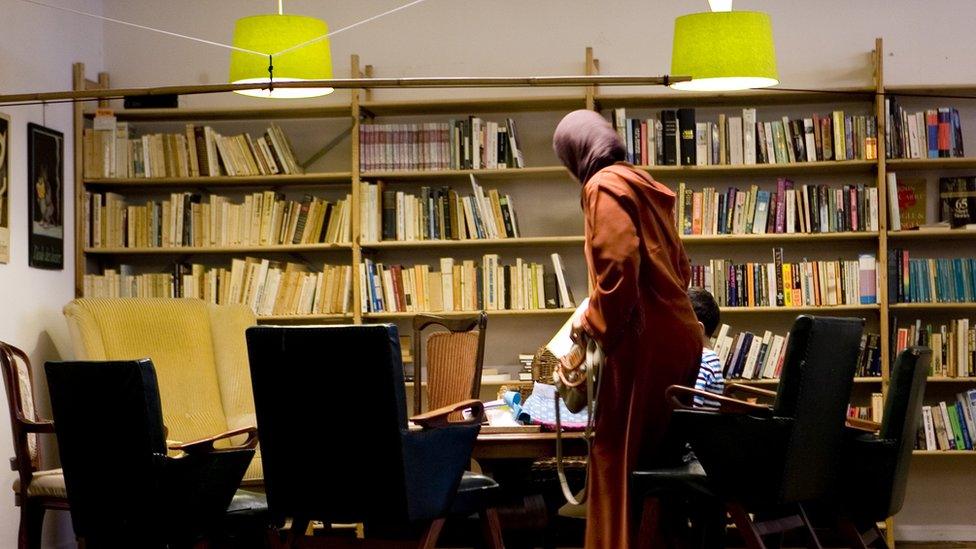Libraries: The decline of a profession?
- Published

Librarians are custodians to a world of information and ideas, performing an important democratic role, their supporters argue. But with 8,000 jobs in UK libraries disappearing in six years, is that status under threat?
It was an inauspicious time to join the profession. Lauren Smith completed an MA in librarianship at the University of Sheffield in 2010, the same year Chancellor George Osborne unveiled the biggest UK spending cuts for decades.
Since then, libraries have seen an influx of volunteer staff - from Doncaster to Dorset, from Gateshead to Gloucestershire - and a quarter of paid jobs have disappeared.
Dismayed by what she sees as an attack on her profession, Ms Smith has become a campaigner for Voices for the Library, external.

Lauren Smith is a spokeswoman for Voices for the Library
She believes volunteers, though well-meaning, are simply unaccountable.
"They often don't turn up to open the library when it's supposed to be open. They don't have the training to do the things they need to do.
"As an example, a friend of mine tried to register at her local library last week and the volunteer had to phone for help twice before they worked out how to use the computer system."
Librarians adhere to a code of professional conduct in the same way that doctors, lawyers and accountants do, Ms Smith argues. By bringing in thousands of volunteers, those ethics become watered down.
"Volunteers may harbour prejudices and biases and could prevent people from accessing information or using the library space.
"Council employees are held accountable for their conduct and librarians are accountable to their professional body - there is no such accountability for volunteers."
How are our library habits changing?
For others within the sector, adopting a volunteer model is akin to a leap in the dark.

Some of the volunteers at The Reading Room are in primary school
Ian Anstice, who has an MA in librarianship, said: "It must seem like a dream solution to many politicians. However, it's a nightmare to anyone who wants to run an effective national public library service.
"It atomises the public library system into various local clubs, run by people often without any training, who often do not have any long-term resources.
"Buoyed along by early optimism, such libraries may do well for a short few years, but what chance they have in the long term is anyone's guess?"
Mr Anstice warns of the "hollowing-out" of the service.
He said: "It can come across in many forms: reduced opening hours, reduced book fund, reduced maintenance and reduced staffing."
Despite the dire predictions, however, there have been success stories, both in the UK and abroad.

When the library in a deprived suburb of Rotterdam in the Netherlands was threatened with closure, residents handed in petitions and protested outside civic offices.
When their protest fell on deaf ears, they opened a library themselves.
Three years later, The Reading Room is a thriving community centre in Het Oude Westen, supported by 100 volunteers from 17 nationalities. Even the 81-year-old former librarian came out of retirement to help.
Co-founder Maurice Specht says: "It was time to act, not only the library was closing, but a lot of public spaces and social services were closing.
"The first to figure out what people thought they needed, the second to get a group of people to realise it."
The centre is now open five days a week from 10:00 to 19:00, and later for special events. It runs 120 literary, music and craft programmes a year.
"We have no paid staff or support from paid professionals, which makes it very equal and easy in a way," Mr Specht says.
In Buckinghamshire, a group of volunteers saved a library earmarked for closure. The 50 unpaid volunteers who run the Little Chalfont Community Library have since been recognised with a Queen's Award for Voluntary Service.

Professor Reid said librarianship courses remained popular
Professor Peter Reid, who oversees the Department of Information Management at Robert Gordon University in Aberdeen, believes there will always be jobs for professional librarians.
"I'm sceptical about those that say we are de-professionalising libraries," he says. "There's a difference between those who staff libraries and those who manage them.
"It isn't often qualified librarians issuing the books. They are the ones often behind the scenes."

History of public libraries in the UK

It began with a desire to keep people out of the pub.
The governing classes of the early 19th Century became increasingly alarmed at the moral and physical health of the expanding working class as the Industrial Revolution gathered pace.
Social reforms followed and the 1850 Public Libraries Act ushered in the first libraries.
In 1852, a member of the public in Campfield, Manchester, became the first person in the country to borrow a book in a library supported by public rates.

Professor Reid said courses in librarianship remained popular.
Experts say it is important to note that most librarians do not work in public libraries. The majority work within private collections, universities or schools, or at law firms, museums and government agencies.
"We teach them that their skills are broadly transferable. There are lots of opportunities still," Professor Reid said. "The public librarian as a brand is something that is highly trusted by the public.
"I hope that despite the changes we are seeing, there will continue to be highly skilled professionals out doing the public-facing activities of running libraries. Libraries are the hubs of their communities and that is how it should be."
England has seen deeper cuts to libraries than in the rest of the UK, but Dr Briony Birdi, a lecturer in librarianship at the University of Sheffield, paints a similar picture.
"I think there was a fear when all this started that [students] would vote with their feet," she said.

Dr Briony Birdi teaches an MA in librarianship at the University of Sheffield
"There has been a reduction in the number of students taking the public library modules, but we are starting to pick up numbers again. The students we have are incredibly committed and they are interested in the societal issues.
Although student recruitment numbers have gone down slightly in recent years they are still a "healthy size", she argues, and there is also a strong distance learning programme.
Of course, it is not just the library service that has undergone a period of change and uncertainty. How the service may look within 10 years remains a subject of fierce debate.
Ms Smith, who now works as a research associate at the University of Strathclyde, said the decline in library service pre-dated the 2010 Spending Review and was part of a deeper trend.
"I really don't like to try to be a futurist, but I think the future for public libraries as things stand is a decimated and de-professionalised service with patchwork levels of provision across the country," she said.
- Published29 March 2016

- Published29 March 2016
